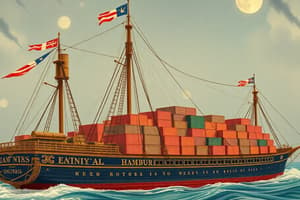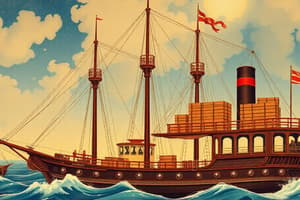Podcast
Questions and Answers
What is the primary role of the carrier in the carriage of goods?
What is the primary role of the carrier in the carriage of goods?
- To receive the goods on behalf of the shipper
- To send the goods to the consignee
- To transport the goods from one place to another (correct)
- To arrange transportation and logistics services
Which of the following is NOT a type of contract used in the carriage of goods?
Which of the following is NOT a type of contract used in the carriage of goods?
- Road transport documents
- Bills of lading
- Shipping agreements (correct)
- Air waybills
Which mode of transport is associated with the use of ships or barges?
Which mode of transport is associated with the use of ships or barges?
- Air transport
- Rail transport
- Land transport
- Maritime transport (correct)
Who is the individual responsible for sending the goods in the carriage process?
Who is the individual responsible for sending the goods in the carriage process?
What is the main challenge when transporting different types of goods?
What is the main challenge when transporting different types of goods?
Which party arranges transportation and logistics services on behalf of the shipper or consignee?
Which party arranges transportation and logistics services on behalf of the shipper or consignee?
What type of goods can be categorized as intangible items?
What type of goods can be categorized as intangible items?
Which of the following best describes the consignee's role?
Which of the following best describes the consignee's role?
Which act governs the domestic carriage of goods in Malaysia?
Which act governs the domestic carriage of goods in Malaysia?
What principle does 'delegatus non potest delegare' represent in the context of carriage of goods?
What principle does 'delegatus non potest delegare' represent in the context of carriage of goods?
In bailment, who is responsible for the safekeeping and return of goods?
In bailment, who is responsible for the safekeeping and return of goods?
Which significant international convention was established to regulate the carriage of goods by sea?
Which significant international convention was established to regulate the carriage of goods by sea?
How did the 19th century impact the law governing the carriage of goods?
How did the 19th century impact the law governing the carriage of goods?
What does the principle of liability established in Roman law hold against carriers?
What does the principle of liability established in Roman law hold against carriers?
Which act was passed by the British Parliament in 1855 to regulate carriers' liability?
Which act was passed by the British Parliament in 1855 to regulate carriers' liability?
Which era saw the establishment of common law rules surrounding the carriage of goods?
Which era saw the establishment of common law rules surrounding the carriage of goods?
What is the main purpose of the Carriage of Goods by Sea Act 1924?
What is the main purpose of the Carriage of Goods by Sea Act 1924?
Which body of law governs the carriage of goods law in Malaysia?
Which body of law governs the carriage of goods law in Malaysia?
What main domestic law governs the carriage of goods by sea in Malaysia?
What main domestic law governs the carriage of goods by sea in Malaysia?
Which act regulates road haulage in Malaysia, despite not addressing cargo liability issues?
Which act regulates road haulage in Malaysia, despite not addressing cargo liability issues?
What do the Hamburg Rules address regarding the movement of goods?
What do the Hamburg Rules address regarding the movement of goods?
Which of the following accurately reflects the framework of carriage of goods law?
Which of the following accurately reflects the framework of carriage of goods law?
What does the Railways Act 1991 provide for in relation to rail haulage?
What does the Railways Act 1991 provide for in relation to rail haulage?
What distinguishes the Carriage of Goods by Sea Act from other transport regulations in Malaysia?
What distinguishes the Carriage of Goods by Sea Act from other transport regulations in Malaysia?
What does liability in the context of carriage of goods refer to?
What does liability in the context of carriage of goods refer to?
Which of the following best defines breach of contract in the carriage of goods?
Which of the following best defines breach of contract in the carriage of goods?
What is the main difference between domestic and international carriage of goods?
What is the main difference between domestic and international carriage of goods?
Which of the following terms relates to events that might excuse a carrier from liability?
Which of the following terms relates to events that might excuse a carrier from liability?
Which type of law varies from country to country and regulates domestic carriage of goods?
Which type of law varies from country to country and regulates domestic carriage of goods?
What does damages refer to in the context of carriage of goods?
What does damages refer to in the context of carriage of goods?
Which vehicle is NOT typically used in land transport for carrying goods?
Which vehicle is NOT typically used in land transport for carrying goods?
Which of the following is NOT a key legal concept related to carriage of goods?
Which of the following is NOT a key legal concept related to carriage of goods?
What is the primary responsibility of the carrier during transportation?
What is the primary responsibility of the carrier during transportation?
Which convention regulates the carriage of goods by sea?
Which convention regulates the carriage of goods by sea?
Who is responsible for delivering goods to the carrier?
Who is responsible for delivering goods to the carrier?
What must the shipper disclose to the carrier before transportation?
What must the shipper disclose to the carrier before transportation?
What does the consignee need to do upon discovering damage to the goods?
What does the consignee need to do upon discovering damage to the goods?
Which of the following parties may be held liable for loss of goods during transportation?
Which of the following parties may be held liable for loss of goods during transportation?
In what situation might the carrier not be held liable for damage to goods?
In what situation might the carrier not be held liable for damage to goods?
What is the role of a trucking company in the context of shipping goods?
What is the role of a trucking company in the context of shipping goods?
Flashcards
Malaysian Carriage of Goods by Road Act 1950
Malaysian Carriage of Goods by Road Act 1950
A Malaysian law that governs the domestic carriage of goods by road.
Bailment
Bailment
The transfer of possession of goods from one person to another for a specific purpose.
Carriers Act 1855
Carriers Act 1855
British law regulating carrier liability for goods loss or damage.
Contracts for the International Carriage of Goods Wholly or Partly by Sea (Hamburg Rules)
Contracts for the International Carriage of Goods Wholly or Partly by Sea (Hamburg Rules)
Signup and view all the flashcards
Roman Law Principle of "delegatus non potest delegare"
Roman Law Principle of "delegatus non potest delegare"
Signup and view all the flashcards
Carriage of Goods Law
Carriage of Goods Law
Signup and view all the flashcards
19th Century Industrialization and Transport
19th Century Industrialization and Transport
Signup and view all the flashcards
20th Century International Conventions
20th Century International Conventions
Signup and view all the flashcards
Carriage of Goods Law
Carriage of Goods Law
Signup and view all the flashcards
Hague Rules
Hague Rules
Signup and view all the flashcards
Hamburg Rules
Hamburg Rules
Signup and view all the flashcards
Carriage of Goods by Sea Act 1950
Carriage of Goods by Sea Act 1950
Signup and view all the flashcards
International Trade and Carriage
International Trade and Carriage
Signup and view all the flashcards
Road Haulage Regulation
Road Haulage Regulation
Signup and view all the flashcards
Rail Haulage Regulation
Rail Haulage Regulation
Signup and view all the flashcards
Carriage of Goods
Carriage of Goods
Signup and view all the flashcards
Types of Goods
Types of Goods
Signup and view all the flashcards
Carrier
Carrier
Signup and view all the flashcards
Shipper
Shipper
Signup and view all the flashcards
Consignee
Consignee
Signup and view all the flashcards
Freight Forwarder
Freight Forwarder
Signup and view all the flashcards
Modes of Transport
Modes of Transport
Signup and view all the flashcards
Transport Contracts
Transport Contracts
Signup and view all the flashcards
Bill of Lading
Bill of Lading
Signup and view all the flashcards
Air Waybill
Air Waybill
Signup and view all the flashcards
Road Transport Documents
Road Transport Documents
Signup and view all the flashcards
Carrier
Carrier
Signup and view all the flashcards
Shipper
Shipper
Signup and view all the flashcards
Consignee
Consignee
Signup and view all the flashcards
Land Transport
Land Transport
Signup and view all the flashcards
Carrier's Duty of Care
Carrier's Duty of Care
Signup and view all the flashcards
Shipper's Duty
Shipper's Duty
Signup and view all the flashcards
Road Transport Documents
Road Transport Documents
Signup and view all the flashcards
Damage Liability
Damage Liability
Signup and view all the flashcards
International Law (carriage)
International Law (carriage)
Signup and view all the flashcards
Domestic Law (carriage)
Domestic Law (carriage)
Signup and view all the flashcards
Liability (carriage)
Liability (carriage)
Signup and view all the flashcards
Damages (carriage)
Damages (carriage)
Signup and view all the flashcards
Breach of Contract (carriage)
Breach of Contract (carriage)
Signup and view all the flashcards
Force Majeure (carriage)
Force Majeure (carriage)
Signup and view all the flashcards
Domestic Carriage of Goods
Domestic Carriage of Goods
Signup and view all the flashcards
International Carriage of Goods
International Carriage of Goods
Signup and view all the flashcards
Study Notes
Introduction to the Law on Carriage of Goods
- This course, GLUE 3073, covers international and domestic carriage of goods at UUM School of Law.
Overview of the Carriage of Goods
- Definition and Types of Goods: Carriage of goods is the transportation of goods from one place to another. These goods can be physical items (raw materials, finished products) or intangible items (electronic data, intellectual property).
- Different goods require different modes of transport, packaging, and handling. This can result in varied risks and challenges during carriage.
Parties Involved in Carriage of Goods
- Carriage of goods involves multiple parties:
- The carrier is responsible for transporting the goods.
- The shipper sends the goods.
- The consignee receives the goods.
- The freight forwarder is a third-party intermediary, arranging transport and logistics services for the shipper or consignee.
Modes of Transport
- Goods can be transported by various modes:
- Maritime (ships, barges)
- Air (airplanes, helicopters)
- Land (trucks, trains, inland waterways)
Types of Contracts
- Carriage of goods contracts, often governing the process, include:
- Bills of Lading (maritime)
- Air Waybills (air)
- Road Transport Documents (land)
- These contracts outline conditions regarding liability, payment methods and delivery terms.
Legal Framework for Carriage of Goods
- Sources of Law: Carriage of goods is governed by international and domestic laws, conventions, treaties, common law, and judicial decisions.
- Key Legal Concepts & Terminologies: The legal framework includes liability (carrier's responsibility for damage or delay), damages (compensation for loss/damage), breach of contract (failure to fulfil obligations), and force majeure (events beyond carrier's control).
Types of Carriage of Goods
- Domestic Carriage: Transportation of goods within a single country, governed by that country's laws.
- Malaysia: Governed by the Malaysian Carriage of Goods by Road Act 1950, Malaysian Contracts Act 1950, and other regulations.
- International Carriage: Transportation of goods across national borders.
Development of Carriage of Goods Law
- Historical Perspective:
- Ancient times involved land and sea transport.
- Roman law introduced "delegatus non potest delegare," meaning a carrier cannot delegate duties.
- Middle Ages in England, bailment (transfer of possession) was key.
- 19th Century: Industrialization led to increased complexity in goods law; acts like the British Parliament's Carriers Act 1855 and Carriage of Goods by Sea Act 1924 (Hague Rules) were introduced.
- 20th Century: International conventions (e.g., UN Convention on International Carriage of Goods, 1978 Hamburg Rules) were developed to manage different transport modes.
Importance of Carriage of Goods Law
- Crucial for international trade, offering certainty and predictability about goods movement, dispute resolution, and liability.
- In Malaysia, the legal framework for carriage of goods encompasses both domestic and international laws. There is no overarching international regime governing transport by road or rail, and Malaysia relies on national licensing laws and regulations or statutes.
Parties Involved in Carriage of Goods
- Carrier: The party that transports the goods.
- Shipper: The party that delivers the goods to the carrier for transport.
- Consignee: The party that receives the goods at the destination.
- Consignee has a duty to notify the carrier of any damage discovered during delivery within a specific timeframe. Failure to do so might affect any future claims.
Studying That Suits You
Use AI to generate personalized quizzes and flashcards to suit your learning preferences.




